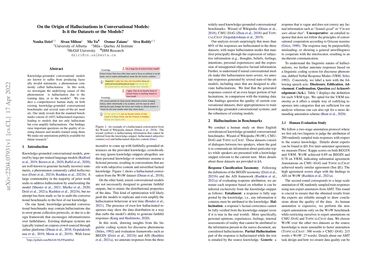On the Origin of Hallucinations in Conversational Models: Is it the Datasets or the Models?
Knowledge-grounded conversational models are known to suffer from producing factually invalid statements, a phenomenon commonly called hallucination. In this work, we investigate the underlying causes of this phenomenon: is hallucination due to the training data, or to the models? We conduct a comprehensive human study on both existing knowledge-grounded conversational benchmarks and several state-of-the-art models. Our study reveals that the standard benchmarks consist of >60% hallucinated responses, leading to models that not only hallucinate but even amplify hallucinations. Our findings raise important questions on the quality of existing datasets and models trained using them. We make our annotations publicly available for future research.
PDF Abstract NAACL 2022 PDF NAACL 2022 Abstract


 Wizard of Wikipedia
Wizard of Wikipedia